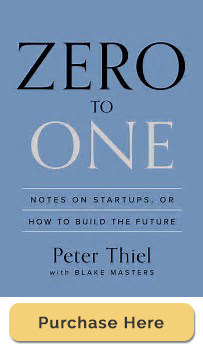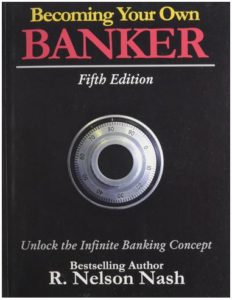 Zero to One is currently in my top five list of entrepreneurial books. I love reading books by founders, and this book is written by a “Founder of Founders.” Peter Thiel is essentially the “Don” of the PayPal Mafia, which is a group of former PayPalemployees that have since gone on to start seven companies that are now each worth over a billion dollars. Just look a these companies:
Zero to One is currently in my top five list of entrepreneurial books. I love reading books by founders, and this book is written by a “Founder of Founders.” Peter Thiel is essentially the “Don” of the PayPal Mafia, which is a group of former PayPalemployees that have since gone on to start seven companies that are now each worth over a billion dollars. Just look a these companies:
- Palantir – Peter Thiel
- YouTube – Steve Chen, Chad Hurley, and Jawed Karim
- Tesla Motors and SpaceX – Elon Musk
- LinkedIn – Reid Hoffman
- Yelp – Jeremy Stoppelman and Russel Simmons
- Yammer – David Sacks
If you’re even remotely interested in entrepreneurship, or the future of business, this book is a must read.
Reading this book was like getting the wisdom from a guy that had advised some of the best and most successful founders in the last 15 years. A fascinating read that does not disappoint. This is definitely not a $100 Start-Up competitor, but there are bits of wisdom that can be applied to any business out there.
I will say that there are some fantastic questions in this book that every founder of a new business needs to consider. Most readers would likely be coming back to read these questions again and again. In addition, Peter questions the status quo and challenges the beliefs of many in ways that might be surprising.
What’s in the Book?
If I had to summarize the contents of the book, I’d say that Peter Thiel believes strongly that we should aspire to think differently, to go against the norm, and to plan for the future. He believes competition is bad for profits and urges that new ventures do their best to avoid it. And finally, Thiel states that the best companies are built upon the foundation of like-minded founders that believe in a secret truth that most people would deny.
“Zero to One is a book that attempts to teach people how to start businesses that have not been done yet.”
The Challenge of the Future
“What important truth do very few people agree with you on?”
This is the question that Peter asks every one of his potential employees during an interview. Obviously a simple question, but a difficult one to answer in an interview. The answer is obviously going to be something you believe is unpopular, something you weren’t taught in school, and probably the last thing you want to say in an interview. The answer requires courage.
“Brilliant people are in very short supply, but courageous people are even more rare in business.”
Peter believes that it takes more than one person to make a great start-up. And that a “start-up can be positively defined as the largest group of people you can convince of a plan to build a different future.”
“A new companies most important strength is new thinking. Even more important than nimbleness, small size affords room to think.”
Peter asks the difficult interview question because if you can identify a mass-delusion (something many people believe that you know to be false) you have a better chance at discovering the contrarian truth behind it.
“We need to question what we think we know from the past.”
As an example of what he is talking about, Peter lists some lessons learned from the dot com bubble that are still used by businesses today
- Make incremental advances (grand visions are suspect)- Small steps are the only safe path.
- Stay lean and flexible (unplanned) – Planning is arrogant – Experiment
- Improve upon the competition – Start with an existing customer
- Focus on product, not sales – Viral growth is the best way
Peter says these lessons are dogma in the tech start-up world today, but he questions if they are true. “The opposite principles are likely more true:”
- Better to risk boldness than triviality
- A bad plan is better than no plan
- Competitive markets destroy profits
- Sales matter just as much as product
All Happy Companies are Different
“What valuable company is nobody building? – This is a hard question”
Peter says that big companies can still be bad businesses. His example is the airlines, that provide a tremendous value, but make very little money because they are in a tremendously competitive market. In contrast, he states that Google provides much less value, but makes a lot more money, because it has a virtual monopoly.
Entrepreneurs should seek to start companies that can obtain a monopoly position of some sort. It may be in a small market, but that market would be owned by your business.
“All happy companies are different in that each earns its monopoly by solving a unique problem. All failed companies are alike, in that they each failed to escape competition.”
The Ideology of Competition
“Creative monopoly means new products for everyone and profits for the business. Competition means no profits for anybody and no meaningful differentiation and a struggle for survival.”
As I mentioned in my summary, Peter dislikes competition for the start-up business. He says the reason we like competition, is because our society and culture are saturated in it. Higher education is a massive competition in that they are selling parents on the “means of turning their children into a conformist for a hundred thousand dollars.”
And yet once our children get into college, the dreams and aspirations they had in High School are likely weeded out of them in order to create more of the same type of graduates that came before them.
“Business is not like war, competition is!”
Peter pushes for finding the business in the non-competitive market. If you can find the place to do business where your customers will be overjoyed you arrived and opened up shop, you’ve found a potential monopoly.
Characteristics of Monopoly
- Proprietary technology – the most substantive advantage. It needs to be 10x better than the competitor
- The best way to create a 10x difference, is to create something new.
- Amazon launched w/ 10x the amount of books offered
- Network effects – building a platform or network everyone wants to use
- Successful networks start by being useful to the first users – a small group (Facebook started with Harvard)
- Economies of Scale – A monopoly business gets stronger as it gets bigger
- Software companies are especially good at this because the cost of producing another copy is nil
- Service businesses will struggle to scale
- Branding – We can’t all be Apple, but it helps if you are
Peter warns about going too big at first. Start the business small, and err on the side of being too small, so you can dominate.
“Once you dominate a small market. Scale up with related markets.”
The idea that we need to disrupt is untrue. You are much more likely to create a successful business if you don’t go up against the big players. If it happens by accident, fine, but avoid competition if possible.
You Are Not a Lottery Ticket
One of the more interesting parts of the book, was the chapter in Zero to One that talked about planning and success. Peter is very quick to downplay the educational system in America today.
“Process trumps substance in America today! … High School and College prepare a person for a “broad” world, for “many-sided mediocrity””
Peter encourages people to strive for doing “something substantive” instead of “pursuing “many-sided mediocrity” and calling it “well-roundedness.””
Definite Future, or Indefinite Future?
People view the future differently. According to Peter there are four possible views of the future that breakdown as follows:
- Indefinite pessimism
- Most people are pessimists. They look at a bleak unknowable future and have no idea where to go
- Europe since the 1970’s is in this state. They react to what is happening, they take vacation after vacation, but ultimately have no idea where to go next.
- Definite pessimism
- They believe the future is bleak, but it is predictable. So they need to be prepared.
- China is the most “definite pessimist” in the world. China is the only country in the world that doesn’t believe that it will eventually take over the world. They all believe that success cannot continue, that it will have to come to an end.
- Definite optimism
- The future will be better than the present if they plan for it.
- The 17th Century through the 20th Century saw the most “definite optimists” than ever before. Much of the world resources were made to better the existence of man.
- Indefinite optimism
- The future will be better, but they don’t know how.
- They re-arrange already invented processes. It’s a world in which “tweaks” of existing things dominates.
- This mentality has dominated America since 1982.
Wall Street and the Indefinite Future
Peter castigates the money managers of today by stating the following:
Finance epitomizes indefinite optimism in that it is the only way that you know you can make money when you have no idea what will happen. In an indefinite world, the best way to make money is to invest money in a diversified portfolio. The bankers, wall street, money men, have no idea what will happen next, they just know they can make money by diversifying and charging a “management” fee.
Note: One of the great things about Infinite Banking is that it’s the opposite of what Peter is talking about here. You aren’t just sitting back and hoping for the best, you’re actively involved in using and growing your money. In fact, you’re able to grow your money the slow way through arbitrage, while also using it to invest in those opportunities that best suit your needs.
Peter goes on to show how politics, government, and philosophy in America are all fundamentally sold on the concept of an indefinite future. And then he says that “the first three views of the future can work. But the fourth is unsustainable.”
- Definite optimism works because you decide what you’re going to build and then you build it
- Definite pessimism works because you build what can be copied without expecting anything new
- Indefinite pessimism works because it becomes self-fulfilling. If you are a lazy slacker, you probably don’t expect much, and that’s likely what you’ll get
- Indefinite optimism does not work because it is not sustainable. How can the future get better if nobody plans for it?
Evolution or Design?
Peter believes the reason we follow this ideology is because we believe in evolution – or simply put, progress without a plan. He doesn’t think it works in business, and he stresses we need to return to progress due to a designer.
“The lesson to be learned is that definite multi-year plans can change the world. It does not come from focus groups and surveys.”
“Our culture needs a revolution against the unjust tyranny of chance”
Secrets
Peter still believes that there are many secrets in the world. He knows the question “What valuable company is nobody building” is hard to answer. But he believes the answer is out there.
“Every great company is built around a secret believed by those at the company.”
Solid businesses need to have founders that are unique, but unique in the same way. As an example Peter mentioned that all the founders at Paypal loved Cryptonomicon and Star Wars, but not Star Trek. His point is just that you have to have a group that is cohesive and works well together. And this group needs to be able to think differently about things, but more specifically they need to believe in the truth behind the secret of their business.
Final Thoughts
Peter says that most businesses fail “because they [don’t] answer the 7 questions of business.”
- The Engineering question: Can you create break-thru technology instead of incremental advancements?
- Companies need to strive for 10x improvement over existing competitors.
- The timing question: Is now the time to start your particular business?
- Building microchips in the 1970’s was good timing. Building solar cells in the 2000’s is not.
- The monopoly question: Are you starting with a big share of a small market?
- Trillion dollar markets mean brutal competition
- The people question: Do you have the right team?
- Never invest in a tech CEO that wears a suit
- The distribution question: Do you have a way to both create and deliver your product/service?
- Selling and delivering a product is a HUGE part of the business
- The durability question: Will your market position be defensible, 10 & 20 years in the future?
- Aim to be the last company in your market
- The secret question: Have you identified a unique opportunity that others don’t see?
- Great companies have secrets that not everyone else can see. If everyone thinks that solar is the next great business, then how will you profit? What is your secret?
“Any great business plan has to address all of these questions. Getting 5 right is likely to create success. Not having the answer to most or any, is a recipe for failure.”
Peter believes that the lesson to be learned for business in general is that we need founders. Those with unique personalities and the ability to think differently. Peter says “Founders are important not because their work is the only work that has value but because a good founder can raise the level of all the other workers in the company.”
In the last chapter Peter talks about the Singularity. “The event which suddenly takes our understanding into a whole new level….” This idea that we are approaching the Singularity is shared by many optimistic tech followers, and many believe it is inevitable. But Peter cautions that it “does not happen unless we go from Zero to One, unless we start thinking for ourselves, unless we start envisioning unique and different ways to improve our current way of doing things.”
Any reader of Zero to One comes away from the experience with the knowledge that Peter Thiel doesn’t like following the herd. He loves the path less traveled and he preaches it eloquently. At I&E we also believe in taking the path less traveled, and we believe that those that are looking to make the most out of their financial future would do well to use our expertise. Please contact us if you’d like to get a free evaluation of your financial situation, we would be happy to connect.




